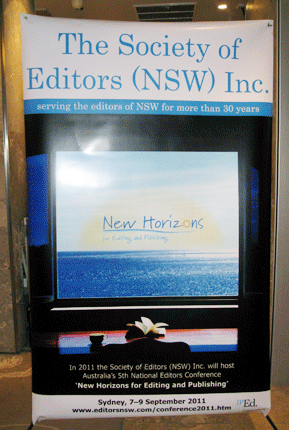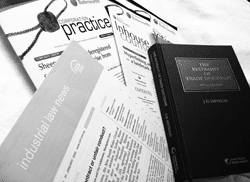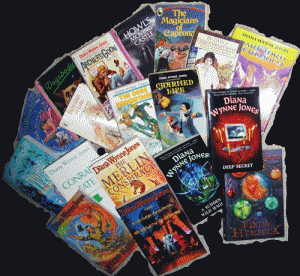The more observant among* you may have noticed it’s been a while** since I last updated this blog. This is in part due to the demands of Real Life, which recently included attendance at Conflux and involvement in the National Editors  Conference.
Conference.
Each of these were opportunities to meet fellow editors and writers, and to discuss language. And many arguments were had by all.
Many. Arguments.
Universal wisdom, nay, the RULE that guides all editors, states the editor’s job is to make the written word plain and simple for the reader. Take out flowery language, antiquated words and jargon, and replace them with plain English and functional phrasing.
But here’s the thing. Rules, as we’re also told, are made to be broken.
I don’t always think the plainest wording is the right wording. I certainly think any text – whether it’s a business brief or a fantasy novel – needs to be clear and easy to understand, but I also think you need to remember the audience and the purpose of the chosen words. (And if you’re the editor, rather than the writer, it’s worth considering that the writer may well have chosen specific word types for a specific reason before you impose blanket changes on a document.)
Flow, structure, intent, resonance, connotation etc. also need to be considered as you “clean up” your own or someone else’s writing.
The plain English argument comes up all the time and, of course, it was discussed many times during the National Editors Conference. One of the clearest off-the-cuff moments for me, however, was during one of the Style Council sessions following the Conference. One of the panellists was pulled up, light-heartedly, by his fellow speakers (and several audience members, besides) for repeatedly using the word “whilst”, rather than “while”. A well-known barrister, he reasoned that he used it all the time in his legal writing, where such “antiquated” and formal style is expected, but admitted he tried to avoid it in ordinary speech and writing***.
 Working with legal publishers, I find I am nearly always encouraged to simplify and modernise any material that isn’t direct court**** transcript or government legislation. Capitalisation is minimised. “Whilst” and “amongst” are right out, along with any other “archaic” spelling. Most legal documents are already complex and wordy, and sometimes filled with jargon, so it seems reasonable and logical to simplify textbooks and legal commentary for an intended audience who may not be legally trained.
Working with legal publishers, I find I am nearly always encouraged to simplify and modernise any material that isn’t direct court**** transcript or government legislation. Capitalisation is minimised. “Whilst” and “amongst” are right out, along with any other “archaic” spelling. Most legal documents are already complex and wordy, and sometimes filled with jargon, so it seems reasonable and logical to simplify textbooks and legal commentary for an intended audience who may not be legally trained.
But I baulk at applying the same principles when it comes to fiction. Sure, “amongst” and “whilst” are not always suitable and could seem dated or clunky in, for example, a fast-paced action adventure set in the present day; but in a historical context, or in many medieval style fantasies, such wording seems wholly appropriate. If I am called on to make the choice while editing*****, sometimes I will even make allowances for speech over narration if the pattern of narration or a particular character’s speech seems appropriately – and consistently – “Olde Worlde”. And this despite a blanket rule in many style guides, and certainly in The Universe, that states such wording must cease and desist. Editorial rebellion. Are you quaking in your boots?
There is, to be sure, a fine balance between what seems appropriate and natural, and what reads as clichéd and overwritten, but these words - dismissed as overly formal and antiquated – have their place in works that are themselves intended to read formally, or which depict old worlds. So long as there is no risk that the reader will be confused or disrupted from the story, the use of certain words over others – even at the expense of crisper, plainer words – can add atmosphere and rhythm to an otherwise sparse-feeling page.
So from antiquated language to jargon. Again, I fear I shall say something controversial. First, let me state up-front that I am a dedicated player of boardroom bingo*******. And I have no interest in continuing the lives of weasel words or promoting ambiguous phrasing. But I would venture to suggest that in some instances, in some industries, jargon – or industry-specific terminology – has pervaded the rest of our culture enough that it is more easily understood than the plain English equivalent.
Of course, this again varies depending on audience. If you’re writing a medical journal aimed at physicians, they will have a different grasp of language than intended readers of a general health and fitness magazine, which is different again to an advisory brochure designed for children and families. And I have said before that newspapers are apparently written for an intended audience with a reading age of eleven.
However, lately I have seen jargon-busters suggesting, for example, we do away with particular well-known medical or legal or business terms in favour of longer, simplified plain English phrasing. The problem is… most of the time I have had trouble untangling the meaning of the plain English alternative. This is because the original terms have become familiar not just because of their industry use, but because they are used so frequently in popular culture. Film and TV courtroom dramas, police procedurals, murder mysteries, forensic thrillers, hospital soap operas, and so on all contrive to teach us new terms so that eventually it is actually easier to understand those terms than the more long-winded but simple phrasing.
I am not suggesting that plain English is a bad thing, or that we all need to add Shakespearean flourishes to every page, or particularly that we should embrace the use of jargon in our everyday lives and look to soap operas to guide all our language use. Far from it. I do think, though, that there is a time and a place for all words and styles – as long as your reader can still understand what you’re trying to say.
What do you think? Are you a fan of flowery phrasing? Are you a jargon junkie? Or are you an absolute minimalist when it comes to getting the message across?
*amongst
**awhilst – see what I did there?
***This qualifying comment meant warning cries went off every time he used “whilst” thereafter…
****Court
*****And for all I expect to lose my editing licence for claiming “amongst” is ever acceptable, this decision process occurs more often than you’d think. Those “-st”s are as common as the double-space-after-a-full-stop******…
******Just so we’re clear, that double space is entirely unnecessary. No typewriter = no double space.
*******Although generally I lose on account of giggling. My favourite real-life example of a made-up corporate word is “helicoptic lens”. No, I don’t know either.




